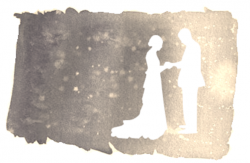What to Do with a Wedding Ring when a Loved One Dies
Few pieces of jewelry have more meaning than a wedding ring. Although family heirlooms, class rings, sports jewelry, and other items often have sentimental value of their own (not to mention high price tags), it’s the sign of our lasting commitment that carries the most weight.
When a spouse or parent dies, it can be difficult to know how to handle the issue of the wedding ring. Should it be buried with the deceased? Kept aside to be passed down to the next generation? Otherwise memorialized so that everyone can enjoy it?
At a time when family tensions are already running high, the added pressure of deciding what to do with a wedding ring can cause fractures. Here are a few things to take into consideration as you sit down to determine how to handle this sensitive issue.
Burying the Ring with the Deceased
When the interment option is burial, most families choose to have the ring buried with the deceased. Burial is a ceremonial way to dispose of a loved one’s remains, so the idea of placing valuables in the casket (whether it’s a wedding ring or a medallion or even fancy clothing) is one that we accept with relative ease.
Whether the ring is worn on the finger, around the neck, or placed in a specialty drawer, there is something fitting about ensuring the deceased is laid to rest with a token of their love and commitment. This is especially true if the other spouse has already been buried and also chose to keep their ring close.
Keeping the Ring to Pass On
With the rise in cremation, it’s becoming more common to keep personal items like wedding rings. Although you can have a loved one cremated with a ring intact, it’s just as easy to slip it off and keep it separate. You can always still place the ring inside the urn with the ashes, which makes it ceremonial as well as retrievable (as long as you keep the urn handy).
You can also keep the ring out of the casket during burial. Burying anything valuable can come with doubts later on, as the cost and process of unearthing a casket is one that few people are willing (or able) to undertake. Reasons for keeping a ring aboveground include:
Wanting to pass it on to the next generation
- Sentimental value
- A large family who cannot agree
- For resale or to divide as part of an estate
- Because it was specified in the will
- If there are any doubts
Advance Funeral Plans
Even if you don’t want to pre-pay for a funeral, it’s a good idea to have a conversation about things like wedding rings before death occurs. What might not seem like a big deal right now can become a huge issue once you lose someone you care about.
Make a plan for the wedding ring as well as other heirlooms while you still have time. That way, it will feel good to know that you’re acting in accordance with the deceased’s wishes whether the ring stays with you or goes on to the grave.




